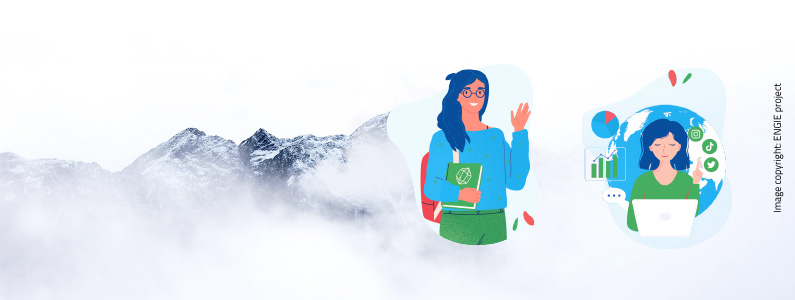Empowering young girls to study geosciences and geo-engineering
Today marks the International Day of Women and Girls in Science, initiated by UNESCO and UN Women in 2015. On this day, we want to bring attention to the importance of science and gender equality vital for the achievement of the UN Sustainable Development Goals (SDG), including SDG 5.
The ENGIE project supported by EIT RawMaterials aims to turn the interest of 13-18 years old girls to study geosciences and related engineering disciplines. As career decisions are made generally in this period of life, the impact of the project is expected to contribute to improvement in the gender balance in the fields of these disciplines.
To celebrate this day with our Innovation Community, we asked Éva Hartai, ENGIE Project Coordinator, Honorary Professor at the University of Miskolc, what inspires her the most working with young girls and empowering them to choose a career path in geoscience.
Diverse working teams are more creative and effective
“The gender distribution in the geosciences and geo-engineering sectors is definitely imbalanced. It is characterised, more or less, by men and stable male stereotypes. Several statistics prove that diverse working teams are more creative and effective. Therefore, the participation of women in raw materials related sectors is very important. This was the basic starting point when we started to build up the project concept.” – says Éva Hartai.
We asked Éva Hartai about the most rewarding moment working on the ENGIE project: “From the beginning of the project, there was a high interest for the achievements and the consortium received a lot of recognition. However, I would mention two actions which received very positive feedback.” – said Éva.
The first was the organisation of the ENGIE International Workshop with Invited Women Experts. The main objective of the workshop was to identify the motivators and barriers for empowering young women to become geoscientists and engineers. For this purpose, 18 leading successful women in the field of geoscience and geo-engineering were invited to participate in the forum. The atmosphere of the workshop was inspiring, and the participants are still very interested in the project achievements.
The second notable action was the ENGIE Video Contest. It was very impressive to see the enthusiasm and commitment of the young girls who produced really high quality videos.
A message to young women who want to study geosciences and geo-engineering
Geoscientists and geo-engineers study some of the most important problems of the society, such as energy, water, mineral resources, sustainability of environment, climate change and natural hazards. There is currently a shortage of well-trained geo-professionals and the demand is growing. If you like science, care about the earth, are fascinated by the natural world, and like working outdoors, consider being a geoscientist or geo-engineer.
Éva Hartai, ENGIE Project Coordinator, Honorary Professor at University of Miskolc
ENGIE role models inspiring the next generation of geoscientists
The ENGIE project showcases role models in geoscience, and we asked Éva Hartai what was remarkable about them and how they will inspire young girls.
“ENGIE role models are female geoscientists and geo-engineers from different countries in Europe. They are successful persons in their career, highly motivated in their job and committed to ENGIE. They represent various sectors of geosciences, and they can communicate their motivations and feelings about their profession in an engaging and inspiring way.” – highlighted Éva Hartai.
Changing the way science is communicated
As ENGIE project is committed to inspire and empower more young girls study geoscience, we asked Éva how the project will impact the raw materials sector:
“Expectedly, the actions in ENGIE will have a direct impact on the gender balance in the raw materials sector by helping to change the way science is communicated and increase the participation and interest of girls in geosciences. Project activities will be extended to more than 20 European countries, setting the stage for new dialogues and creating substantial awareness for the gender issue at both European and national levels. With the promotion of the gender balance in the primary raw materials sector, ENGIE can have a long-term positive impact in Europe.” – said Éva Hartai.
We encourage you to learn more about the ENGIE project and spread the word about this great initiative.




